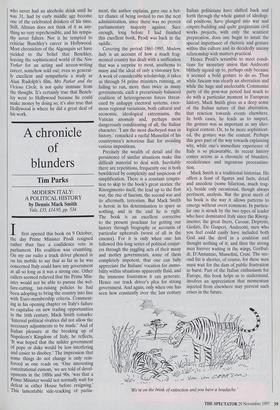A chronicle of blunders
Tim Parks
MODERN ITALY: A POLITICAL HISTORY by Dennis Mack Smith Yale, £35, £14.95, pp. 534 Ifirst opened this book on 9 October, the day Prime Minister Prodi resigned rather than face a confidence vote in parliament. His coalition was crumbling. On my car radio a truck driver phoned in on his mobile to say that as far as he was concerned Italy could have any government at all so long as it was a strong one. Other callers seemed relieved that the Prime Min- ister would not be able to pursue the wel- fare-cutting, tax-raising policies he had been adopting to bring the country into line with Euro-membership criteria. Comment- ing in his opening chapter on Italy's failure to capitalise on new trading opportunities in the 16th century, Mack Smith remarks: `Internal political rivalries did not allow the necessary adjustments to be made.' And of Italian pleasure at the breaking up of Napoleon's Kingdom of Italy, he reflects, `It was hoped that the milder government of pope or duke would be less interfering and easier to disobey.' The impression that some things do not change is only rein- forced as one reads on. 'One interesting constitutional custom,' we are told of devel- opments in the 1880s and 90s, 'was that a Prime Minister would not normally wait for defeat in either House before resigning.' This lamentable side-tracking of parlia- ment, the author explains, gave one a bet- ter chance of being invited to run the next administration, since there was no proven parliamentary majority against. Sure enough, long before I had finished this excellent book, Prodi was back in the saddle.
Covering the period 1861-1995, Modern Italy is an account of how a much frag- mented country has dealt with a unification that was a surprise to most, anathema to many and the ideal of only a visionary few. A work of considerable scholarship, it takes us through 54 prime ministers running, or failing to run, more than twice as many governments, each a precariously balanced coalition of heterogeneous forces threat- ened by unhappy electoral systems, enor- mous regional variations, both cultural and economic, ideological extremisms, the Vatican anomaly and, perhaps most dangerously conditioning of all, the Italian character. 'I am the most disobeyed man in history,' remarked a rueful Mussolini of his countrymen's notorious flair for avoiding various impositions.
Precisely the wealth of detail and the persistence of similar situations make this difficult material to deal with. Inevitably there are repetitions, frequently one is both bewildered by complexity and suspicious of simplification. There is a constant tempta- tion to skip to the book's great stories: the Risorgimento itself, the lead up to the first war, the rise of fascism, the second war and its aftermath, terrorism. But Mack Smith is heroic in his determination to spare us nothing, and in the end he is right. The book is an excellent corrective to the present penchant for getting our history through biography or accounts of particular upheavals (worst of all in the cinema). For it is only when one has followed this long series of political conjur- ers through the juggling acts of their many and motley governments, some of them completely impotent, that one can fully appreciate the Italians' vocation for immo- bility within situations apparently fluid, and the immense frustration it can generate. Hence our truck driver's plea for strong government. And again, only when one has seen how constantly over the last century Italian politicians have shifted back and forth through the whole gamut of ideologi- cal positions, have plunged into war and empire-building and quite gargantuan civil works projects, with only the scantiest preparation, does one begin to intuit the special importance of rhetoric and gesture within this culture and its decidedly uneasy relationship with matters practical.
Hence Prodi's scramble to meet condi- tions for monetary union that Andreotti blithely signed up to, perhaps only because it seemed a bold gesture to do so. Thus while fascism was clearly an aberration and while the huge and unelectable Communist party of the post-war period had much to do with a particular moment in European history, Mack Smith gives us a deep sense of the Italian nature of that aberration, that reaction towards events elsewhere. In both cases, he leads us to suspect, the gesture was as important as any ideo- logical content. Or, to be more sophisticat- ed, the gesture was the content. Perhaps this goes part of the way towards explaining why, while one's immediate experience of Italy is so pleasurable, its recent history comes across as a chronicle of blunders, recalcitrance and ingenious procrastina- tion.
Mack Smith is a traditional historian. He offers a feast of figures and facts, detail and anecdote (some hilarious, much trag- ic), beside only occasional, though always pertinent, analysis. But the great merit of his book is the way it allows patterns to emerge without overt comment. In particu- lar one is struck by the two types of leader who have dominated Italy since the Risorg- imento; the great fixers, Cavour, Depretis, Giolitti, De Gasperi, Andreotti, men who you feel could easily have included both God and the devil in a coalition and thought nothing of it; and then the strong men forever waiting in the wings, Garibal- di, D'Annunzio, Mussolini, Craxi. The sec- ond list is shorter, of course, for these men must wait for the dam of public frustration to burst. Part of the Italian enthusiasm for Europe, this book helps us to understand, involves an appreciation that momentum injected from elsewhere may prevent such crises in the future.
`We're on the brink of extinction and you have a headache.'


















































































 Previous page
Previous page